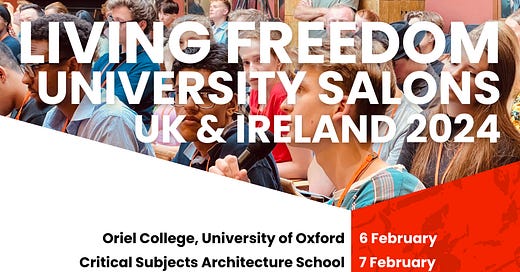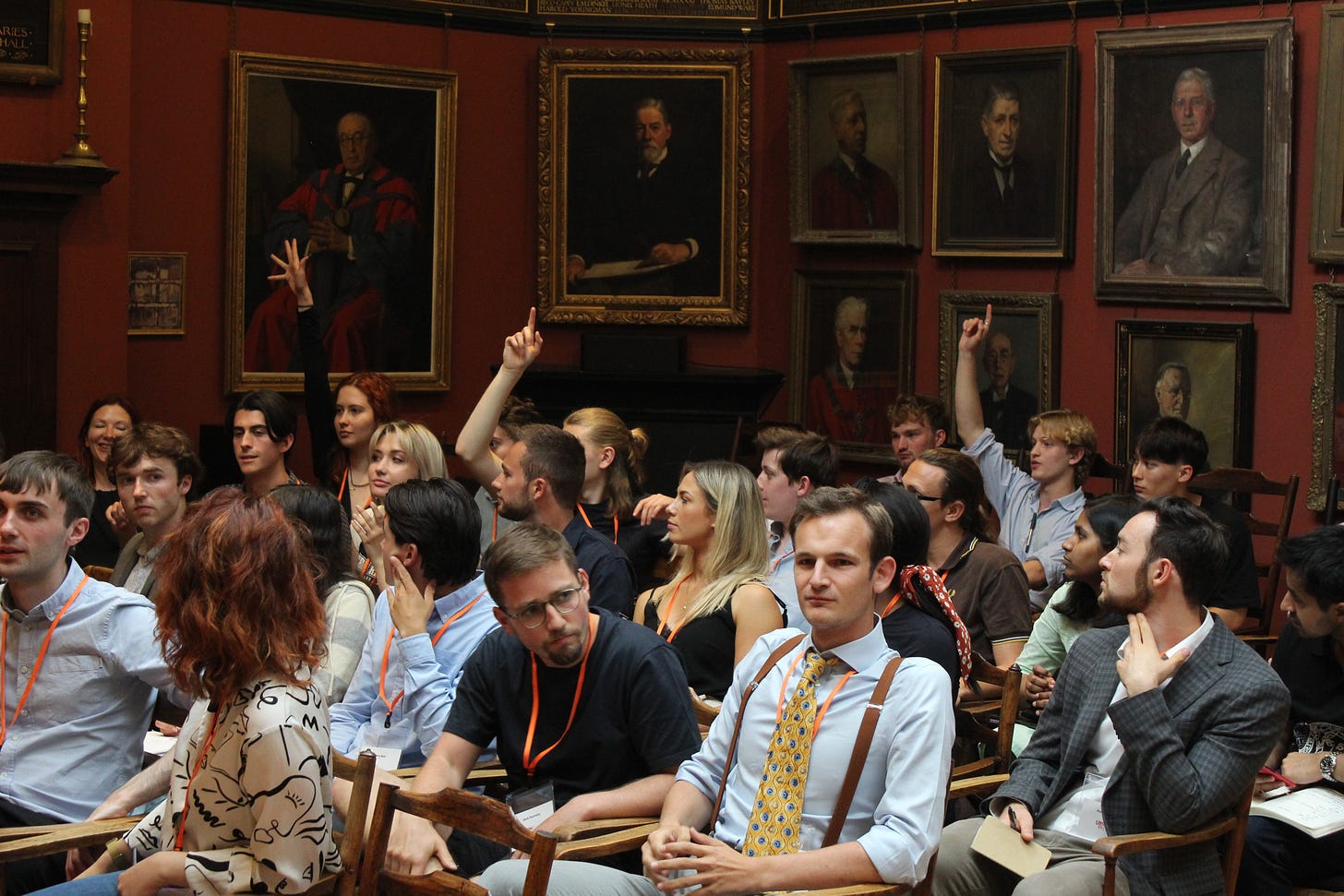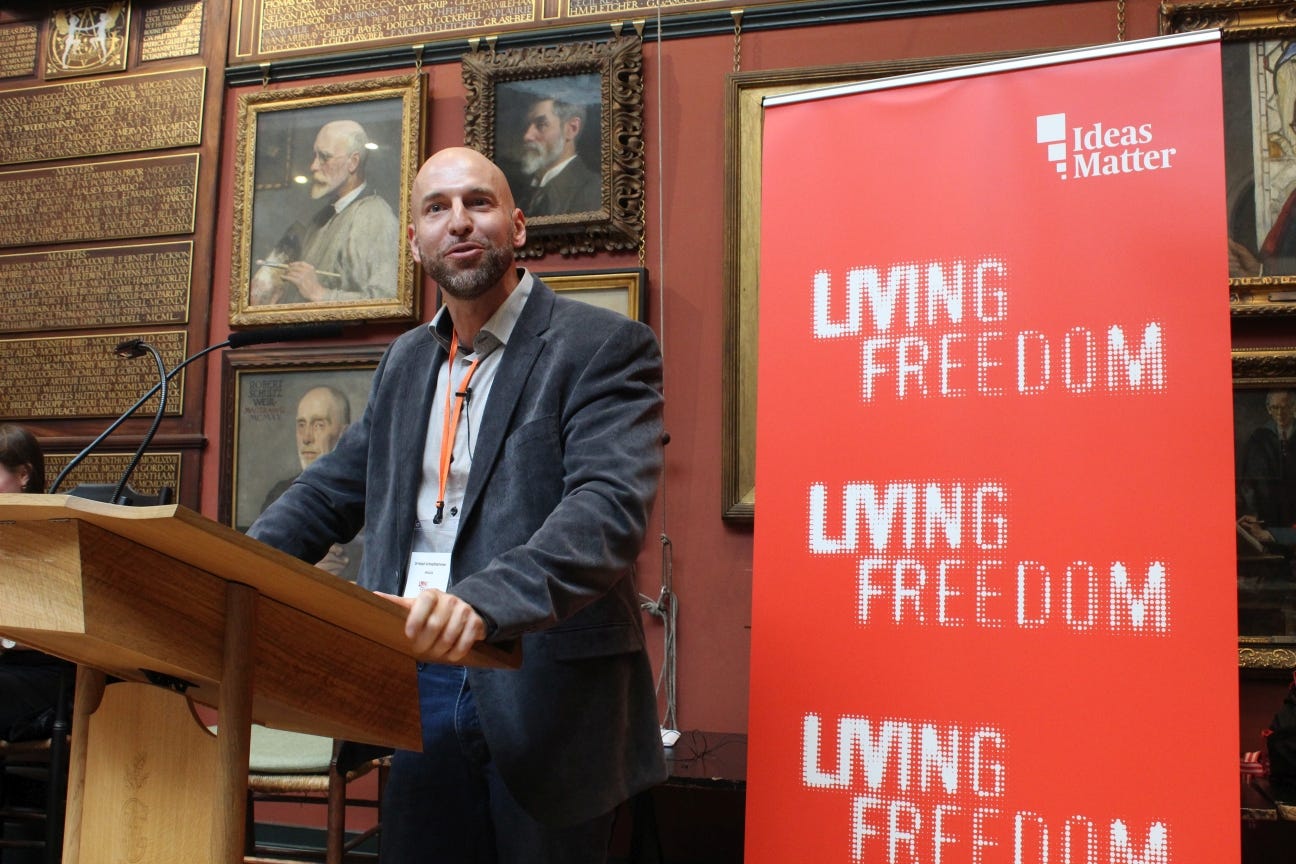Building a culture of freedom on campus
Alastair Donald introduces the Living Freedom free speech salons that will be touring UK universities during February and March.
On 6 February, Ideas Matter, the educational and citizenship charity, launches Living Freedom University Salons 2024, an extensive programme of talks and debates that will take place in universities throughout February and March.
Kicking off at Oriel College, University of Oxford, Jacob Reynolds, head of policy at MCC Brussels, explores the work of Hannah Arendt and on totalitarianism. In the weeks that follow, salons will take place in universities from Exeter to Aberdeen and include events in London, Warwick, Cambridge and Dublin.
Discussions span issues such as free speech and identity politics, utopian thinking, John Stuart Mill’s ‘harm principle’, freedom in a digital age and the radical universalism of CLR James.
All these events are free and everyone – students, academics and the public - is welcome to join. See below for details of each event.
ABOUT LIVING FREEDOM
Living Freedom exists to renew freedom through education and debate, Since the launch in 2017, hundreds of young adults aged 18 to 30 have attended our annual summer schools.
Now, with the support of the Ian Mactaggart Programme administered by the Free Speech Union, students and academics throughout the country will benefit from Living Freedom’s unique brand of talks and discussions that explore both historic ideals of freedom and burning contemporary issues.
UNIVERSITIES AND FREE SPEECH
This salons programme in universities precedes the introduction in August of a new legal duty upon higher education providers to protect and promote free speech that results from the Higher Education (Freedom of Speech) Act 2023.
After years of frustration over constraints on openly and critically discussing controversial topics, whether due to internal corrosion of free speech or external pressures from politicians, many are hopeful that the new Act will ensure that cultural conformity and stifling of viewpoint diversity on campus are a thing of the past.
But to avoid a situation where the new duties simply become a series of administrative procedures, box-ticking and never-ending recourse to complaints procedures, it is vital to build cultural support for free speech and open discussion within institutions. Freedom needs to become a motto to live by, rather than a bunch of procedures to which students and academics must comply.
A DEMAND FOR OPEN DEBATE
That is where university salons come in - forums where students of all political views can come together in a tolerant atmosphere, to listen to forthright views, ask awkward questions and debate controversial issues, as a means to working out one’s own views on an issue.
In that sense, we have been heartened by the appetite for salon discussions amongst many colleges, academics and students who have been central to organising this salons programme. Marie Daouda, stipendiary lecturer in French at Oriel College, University of Oxford welcomes Living Freedom salons because ‘Oriel College holds a firm commitment to the principles of freedom of thought, speech and intellectual inquiry and prides itself on creating opportunities for students to engage in respectful open debate’.
The quest is to expand the commitment to open discussion that is evident at Oriel. At a time when fragmented identity groups reign over aspiration for universal values, in Durham, the director of Don’t Divide Us, Alka Sehgal Cuthbert, will explore the life and work of Frederick Douglass, the nineteenth-century African American, who escaped slavery to become a leading abolitionist. For Professor Tim Luckhurst, principal of South College, Durham University, the salon will offer his students ‘a great opportunity for students to engage in debate about inspiring ideas that have contributed to the western ideal of democratic government by consent’.
Regardless of years of talk of ‘snowflake’ students, these salons respond to demand from students themselves for more debate. For example, we’ve been working with students from the flourishing Speak Easy network, which Vinay Kapoor, president of the Warwick branch says, are keenly pursuing ‘discussion of ideas through debate and inquiry’.
ABOUT THE UNIVERSITY SALONS 2024
To meet those aspirations, we’ve assembled an enviable group of experts, commentators and critics. At London School of Economics, writer Ralph Leonard and WORLDwrite director Ceri Dingle – co-director of Every Cook Can Govern – will explore the radical universalism of CLR James. In Aberdeen, Rob Lyons, science and technology director at Academy of Ideas, will look at the question of personal autonomy and reflect on what we should make of John Stuart Mill’s famous ‘harm principle’ in an age where harms abound.
At Selwyn College Cambridge and Trinity College Dublin, writer and broadcaster Timandra Harkness explores the implications for free speech of new digital technologies and identity-driven forms of culture and politics. As presenter of the BBC Radio 4 series How To Disagree, Harkness looked forward to her talks, pointing out that: ‘It’s always a pleasure to speak to a Living Freedom audience because I know my ideas will be challenged - in a civil and thoughtful way - by people who want to think for themselves. There are no tribal prejudices or lazy groupthink at these events. The range of opinions and approaches is refreshing, brought together in a spirit of genuinely open debate.’
For a decade and more, many have worried that such spirit of debate has gone forever in universities. But Living Freedom Salons represent a chance to stake out a different future. All those interested in making that happen should join us. And any students academics or colleges keen to host a salon should get in touch.
Full details of the programme can be found below and on the Living Freedom website.
LIVING FREEDOM SALON TOUR 2024
Dates include:
Tuesday 6 February
Oriel College, University of Oxford
Wednesday 7 February
Critical Subjects Architecture School, London
Thursday 15 February
Selwyn College, University of Cambridge
Friday 16 February
South College, University of Durham
Tuesday 20 February
King’s College, University of Aberdeen
Thursday 22 February
University of Warwick
Tuesday 12 March
Trinity College Dublin
Tuesday 19 March
London School of Economics
Wednesday 20 March
University of Exeter







